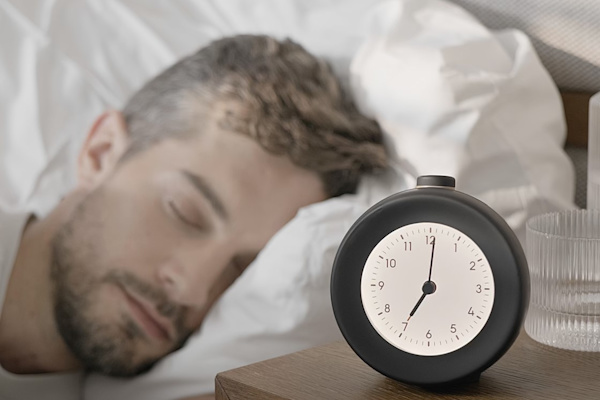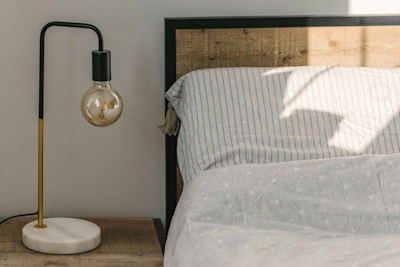
7 Science-Backed Benefits of Waking Up with an Analog Alarm Clock
Your smartphone might be sabotaging your sleep & you might not even know it.
That innocent-looking device sitting on your nightstand, dutifully serving as your alarm clock, could be wreaking havoc on your sleep cycles, morning mood, and daily productivity. While millions of people reach for their smartphones as the last thing they do before sleep and the first thing when they wake up, research reveals this seemingly harmless habit may be one of the most damaging choices we make for our well-being.[1][2]
The solution? It's surprisingly analog.
Traditional, analog alarm clocks, particularly those with gentle, nature-inspired sounds, like Mudita Bell, offer a pathway back to restorative sleep and energized mornings. And before you refer to them as being outdated relics, the truth is these simple devices represent a scientifically-backed rebellion against our always-on digital culture.
If you’re interested in finding out more, stick around & explore seven compelling reasons why swapping your smartphone alarm for an analog alternative could transform your nights, your mornings, and ultimately, your entire day.
1. Preserves Healthy Sleep Cycles by Avoiding Blue Light
Most analog clocks don’t emit blue light, whereas smartphones do. Bright blue-wavelength light from phone screens in the evening suppresses the hormone melatonin, which is crucial for sleep onset.
By reducing melatonin, late-night screen exposure increases alertness when you should be winding down, leading to difficulty falling asleep and less restorative sleep.
In contrast, using a simple analog alarm (and keeping your smartphone in another room at night) helps maintain your natural circadian rhythm. This means your brain can produce melatonin normally, helping you feel drowsy at bedtime and supporting a more regular sleep-wake cycle. Ultimately, the absence of blue light from an analog clock protects your sleep cycles and improves sleep quality, unlike smartphones which can delay your internal clock by signaling daytime to your brain at night. [3]
READ: Screen Time & Sleep: How Digital Devices Affect Sleep
2. Easier Sleep Onset and Higher Sleep Quality
Replacing your smartphone alarm with an analog clock often goes hand-in-hand with better bedtime habits. Without the temptation of scrolling at bedtime, people tend to fall asleep faster and sleep more deeply.
Studies have found that excessive smartphone use at night is associated with longer sleep latency (meaning that it takes you more time to fall asleep) and shorter overall sleep duration. [4]
One large study using the Pittsburgh Sleep Quality Index, a widely used questionnaire that assesses sleep quality, showed that as smartphone screen time in the hour before bed increased, sleep duration and quality decreased. [5][6][7]
Another clinical study in Saudi Arabia found that using a smartphone for more than 60 minutes at bedtime significantly raised the odds of poor sleep quality. [8]
By contrast, an analog alarm clock, like Mudita Bell, encourages you to unplug earlier. Over time, this can translate to falling asleep more quickly and enjoying longer, higher-quality sleep because you’re essentially removing the digital barriers to a good night’s rest.
Mudita Bell 2 is available in Charcoal Black & Pebble Grey
3. Uninterrupted Sleep with No Midnight Distractions
Analog alarm clocks, like Mudita Bell, promote uninterrupted sleep because they don’t ping, vibrate, or light up with notifications in the middle of the night. Simply having a smartphone by the bedside can lead to fragmented sleep – a notification sound or the urge to check messages, or even the time, can easily wake you or pull you into a midnight scrolling session.
Even if notifications are silenced, the mere presence of a phone can be psychologically stimulating or lead to “just one more” quick check. Sleep experts therefore advise making the bedroom a screen-free zone, removing electronic devices from your sleep environments.
Using an analog alarm clock makes it easier to follow this advice. The payoff is more continuous, deep sleep throughout the night. In fact, research suggests that bedtime smartphone use often causes sleep disturbances, which then impair alertness and productivity the next day. By eliminating nighttime phone distractions, an analog alarm helps ensure you sleep through the night and wake up truly refreshed.
READ: Rediscover Peaceful Mornings with an Analog Alarm Clock
4. Lower Anxiety and Stress Levels
Keeping your phone away from the bed with an analog alarm can significantly reduce anxiety and nighttime stress. Smartphones are a direct conduit to an onslaught of notifications, social media updates, news alerts, and work emails.
This “barrage of text alerts” keeps the brain’s stress response activated by constantly feeding it new information.
Psychologists note that each ding or push notification can trigger our fight-or-flight system: the brain perceives a potential threat, releasing adrenaline and cortisol (the stress hormone) and putting us on high alert. Having the phone next to you (yes, that means using it as an alarm)means you’re more likely to check those late-night messages or wake up to a flood of alerts, spiking your anxiety. [9]
Over time, this habit can lead to chronic stress and difficulty relaxing. By contrast, an analog alarm clock, like Mudita Bell, offers peace of mind. No notifications are vying for your attention at 11 PM, so you can unwind properly.
This can help decrease bedtime anxiety and promote a calmer mental state at night. In the morning, you’re greeted by a simple alarm tone rather than overnight messages, allowing you to start the day with a clearer, more focused mind instead of immediate digital stress.
5. Improved Mood and Mental Health
Choosing an analog alarm, like Mudita Bell, over a smartphone can have a positive impact on your overall mood and mental health. One reason is that better sleep quality itself is linked to improved mood and emotional regulation.
Conversely, heavy smartphone use (especially at night, before bed) has been associated with higher rates of depressive symptoms in multiple studies. For example, research on young adults found those with very high mobile phone use were more likely to report depression and lower mental well-being. [10]
Nighttime phone use may contribute to this by disrupting sleep and by exposing users to negative online content or social comparisons at vulnerable moments.
READ: The Mudita Kompakt Solution to Digital Overload
By breaking the habit of using your phone in bed, you remove a source of late-night emotional turmoil (such as doomscrolling through upsetting news). An analog alarm also lets you ease into the morning without immediately deluging yourself in social media or work emails, which can otherwise color your mood with stress or negativity. Overall, this digital mindfulness, enabled by a simple alarm clock, can lead to a brighter morning mood, less risk of tech-related depression, and a greater sense of well-being.
6. Gentle Awakening Reduces Startle and Stress
Traditional, analog alarm clocks, like Mudita Bell, that use gentle, ambient or nature-inspired sounds can wake you more peacefully, avoiding the jarring shock often caused by smartphone alarms. Sudden, blaring alarm tones (common on phones) abruptly yank you out of sleep, triggering a spike in blood pressure and heart rate as your body is startled awake.
This fight-or-flight reaction floods you with adrenaline and can leave you feeling jittery or on edge upon waking. Researchers have noted that loud, harsh alarm sounds in deep sleep can even impair short-term memory and cognitive performance for a while after waking, a phenomenon related to sleep inertia. [11][12]
In contrast, soft and serene alarm sounds (like chirping birds, gentle chimes, or ocean waves) minimize this stress response. Studies indicate that waking up to calmer sound stimuli causes much less activation of the body's stress systems. In practice, an analog alarm clock with a gradual or nature-sound alarm eases you into wakefulness.
This gentler awakening helps reduce morning grogginess and stress, leading to a more relaxed start to the day. Instead of feeling jolted and anxious, you’re more likely to feel calm and centered when your alarm is soothing rather than screaming at you.
7. Better Morning Focus and Daytime Productivity
By improving your sleep continuity and morning routine, an analog alarm clock, like Mudita Bell, can boost your daytime alertness and productivity. High-quality, sufficient sleep is the foundation for optimal cognitive function and the research is clear: it enhances attention, memory, problem-solving, and judgment.
When you ditch the phone at night, you tend to sleep better and avoid the grogginess that comes from both poor sleep and being abruptly shocked awake. The result is that you wake up clearer-headed and ready to focus. In fact, sleep scientists find that improving sleep quality can promote sharper thinking and even reduce the risk of cognitive decline over time.
Furthermore, avoiding bedtime phone use prevents the knock-on effect of next-day fatigue: as one study noted, bedtime smartphone-induced sleep disturbances lead to worse productivity the following day. Using an analog alarm enforces healthier habits, you’re not checking emails at 12AM or hitting snooze repeatedly while checking social feeds. Instead, you start your morning more intentionally (perhaps stretching, reading, or simply enjoying a quiet moment). [13]
This translates to greater efficiency and focus during the day. In short, a phone-free sleep and gentle wake-up can give you more energy, better concentration, and a productivity boost that smartphones in the bedroom might actually jeopardize.
Mudita Bell in velvety Charcoal Black available at Mudita.com
Final Thoughts
Replacing your smartphone's alarm with a traditional, analog alarm clock, ideally one that wakes you with soft, natural sounds, is a simple change that can yield significant benefits for your sleep and mental well-being.
Compared to smartphone alarms, analog alarms protect your sleep (by eliminating blue light and disturbances), reduce stress and anxiety, improve your mood, and help you wake up gently. These improvements in turn enhance your daytime focus and overall quality of life.
The science is increasingly clear that keeping smartphones out of the bedroom is wise for better sleep hygiene and healthier mornings. An analog alarm clock might seem old-fashioned, but it could be the modern prescription for more restful nights and happier, more productive days.
Related stories

5 Things Sleep Experts Say We Still Get Wrong About Sleep
Are you making these 5 sleep mistakes? Learn what experts say about sleep trackers, workout timing, and why hitting snooze makes you feel worse, not better.

Mudita Radiant Earns Kickstarter’s “Project We Love” Badge
Mudita Radiant earns Kickstarter’s “Project We Love” badge after being fully funded in just two hours. Discover our Swiss automatic field watch.

Are Smartphones Breaking Social Norms?
Smartphones are reshaping social norms, disrupting etiquette and face-to-face connection. Learn how mindful tech use can restore balance.
If you'd like to receive the best stories from our blog, keep up to date with our progress and get notified about our product releases and special discounts.